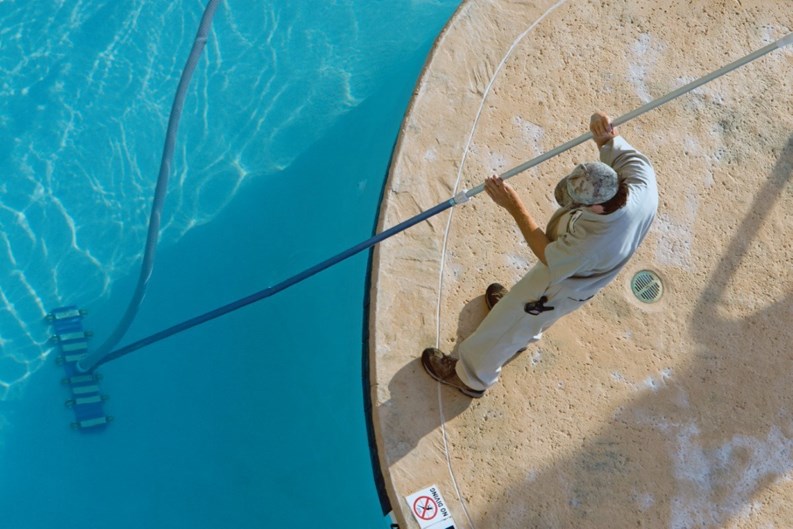With winter finally behind us and summer just around the corner, New Englanders are happy to be shedding their winter gear for shorts and t-shirts and, before we know it, swimsuits. But before that first belly flop into the sparkling clear water of the community pool, a lot of work must be done to get the pools, clubhouses, tennis courts, and recreation areas ready for the summer season. So while many of us are inside counting the days until summer on a calendar, property managers are out working to make sure summer fun arrives on time.
More Than a Day at the Beach
Given the range of specialized and important tasks that goes along with the opening of a community pool, one of the first tasks for a property manager is to decide whether to use an outside pool management service that will take care of everything from insuring all permits are received to doing the daily maintenance of the pool. As Sean Johnson of American Pool Management in Nanuet, New York, explains, services like his allow property managers to deal with just one person rather than making twenty different calls to get the pool ready. Steve DiNocco, CMCA, AMS, of Affinity Realty and Property Management in Boston, Massachusetts, adds an additional benefit: “Using an outside service limits my liability,” he says, noting that the limited responsibility is offset by increased expense. Each pool [in Massachusetts] must have a Certified Pool Operator, and in many cases, it is less expensive for the on-site property manager to gain CPO certification rather than hire an outside company.
In either case, Johnson says, “the key is getting started early.” DiNocco also points out that starting early allows pool operators to check in with their local board of health inspector to ensure the guidelines and regulations are clear before the annual permit inspections. Something that was acceptable in previous years may not be acceptable this year.
An outside pool service such as American Pool Management will address these issues, but Johnson also stresses that it is important for property managers to be involved as well. For example, Johnson suggests that property managers walk the pool deck with the pool service to ensure they agree on the state of the pool and what must be done to pass all inspections and have a safe summer.
For those property managers who decide to do much of the work themselves, the first item on their spring pool “To Do” list is hiring staff. Staff availability in areas where lifeguards are required may determine the hours and days the pool can be open. To find qualified lifeguards, many turn to the local colleges and high schools for Red Cross-certified lifeguards. DiNocco runs ads in the local paper and “hopes they get enough qualified applicants.” Johnson relies more on his current staff to recruit others, saying, “Most of my lifeguards come through word-of-mouth.” Tom Halter, propertymanager at Ransom Oaks in Buffalo, New York, concurs: “We send a flier to the high schools and the Red Cross certification courses, but a large percentage of our lifeguards come from staff who have been with us for years, or through word-of-mouth.”
With staffing in place, managers may then turn to getting the pool physically ready for summer time. First, inspecting the pool itself for cracks and wear is very important. The winter freeze and thaw cycle can crack pavement, pop off tiles, and break the anchors or ladders. These items must be addressed before refilling the pool. The website www.poolmanual.com reminds pool operators to replace any equipment that has been removed from the pool (ladders, divingboards, etc.). Also, any winter plugs put in when closing the pool have to removed, and any jet eyeball fittings, skimmer baskets, and underwater lights reinstalled.
Inspect Everything
It is equally important to inspect all the filtration equipment, checking filters, pumps, and joints for wear or leakage. DiNocco stresses that turningon the filtration system is important: “You want to make sure the water is being run through the system quickly because that can really affect how many chemicals you need.”
One of the final stages of the inspection is of the poolside safety equipment to ensure that everything is in good condition and ready for use. This can include the reach poles, backboards, rescue tubes, and other equipment. It is also important to check and refill first aid kits. For additional information and suggestions on preparing the safety equipment, property managers can contact their local town health and safety departments. In fact, Halter of Ransom Oaks has to file a yearly safety plan with the Erie County health department, which then does a site visit to ensure that everything is in place and ready to go. DiNocco also suggests reviewing the rules of each pool, along with the safety plan, to address any issues that may have come up during the previous season. He believes that well-written and clear rules will help everyone feel comfortable and welcome at the pool regardless of age or mobility.
Because many pools in the New England area must be drained during the winter to prevent ice buildup and cracking, property managers will need to refill their pools and balance the chemicals. While some call on professional pool services to assist in this stage, others prefer to do it themselves. If everything is working properly, it can be a simple operation of filling the pool, adding shock (the first chemical treatment of the season), and then balancing the chemicals–Johnsonestimates perhaps a half a day’s work. If there is trouble, it may take significantly longer to treat the water in preparation for swimmers.
Once the pool is filled and the equipment up and running, it will take anywhere from a few days to a week or so to get the water clear and ready for swimming. Once the water is clear, brush the sides and floor of the pool on the day before you are going to vacuum. Then, the dirt will settle loosely on the bottom and be easier to vacuum up.
Beyond the Pool
Because pools are often centrally located with other recreational amenities, the job doesn’t stop at the water’s edge. Everything from the pool deck to tennis courts and playgrounds demands additional attention.
Although the pool deck is often included in the initial pool inspection, property managers have to take care to seal any cracks, repair any problems with the fences, and address any weeds or bushes that may have crept in during early spring. Pool furniture must be retrieved from where it was stored, inspected for damage, scrubbed down, and returned to its place around the pool.
Some pools also include seasonal club or pool-houses. These must also be cleaned out and reopened. If the bathrooms were winterized, the water needs to be turned back on and the bathrooms disinfected. The clubhousesthat operate year round will still need an inspection and perhaps a spring cleaning.
Heading back outside, tennis courts require similar efforts to prepare them for the summer season. Any cracks or depressions should be repaired by a professional. As with the pool, it is significantly cheaper to do the proper maintenance than to pay for restoration. Once the surface is ready and the courts swept free of debris, the nets should be inspected for defects and replaced if necessary, and then re-hung. Some condos string up wind-nets to preventcross breezes on their courts. Property managers may also go the extra step in repainting lines (this should really be done each year with two coats of a specially-designed paint).
One final area for spring “opening” is the playground. Equipment must be checked for safety, often the grounds need to be swept and cleared of debris, and additional sand or wood chips might need to be brought in for soft landings. Halter says he tries to replacethe wood chips in his playgrounds at least every other year.
Open For Business
Once open, property managers must see that the pool and grounds are maintained throughout the season. Most local health boards require routine water checking three to four times daily, and some pool operators like to do it more often if there is a problem. While this can be done by trained lifeguards, some property managers schedule regular visits to inspect grounds and equipment for damage, and to clean the filters. With this method, it is important to have a logbook filled out daily by the staff for easier monitoring of pool conditions. Using an outside service offers the advantages of not having to worryabout the pool daily, the assurance that the pool is being looked after by a qualified professional, and the peace of mind knowing that the service can be called in an emergency.
Although Mother Nature may have the final say, most managers aim for either Memorial Day weekend or the weekend before as the target date for opening the pool and grounds. As Johnson reminds property managers, “The key is getting started early and getting all the contractors on board early so there are no surprises.” Bob Perry of Maverick Pool in Beverly, Massachusetts, sums it up: “In a nutshell, pools are like people: as they age they require a little TLC to keep them looking and operating at their best.”






Leave a Comment